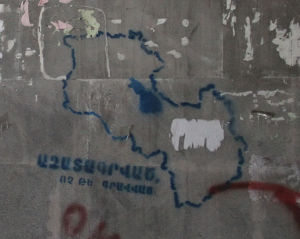Approaching the Red Line: Armenian and Azerbaijani Conflict is Escalating
 On November 12th, Azerbaijani armed forces shot down an Armenian helicopter near the ceasefire line between the two armed forces in the disputed region of Nagorno-Karabakh. While Azerbaijan claimed that the Mi-24 helicopter violated their airspace and was “trying to attack” Azeri positions, Armenia has held that the aircraft was unarmed and that Azerbaijan’s resort to military force was itself an “unprecedented provocation.”
On November 12th, Azerbaijani armed forces shot down an Armenian helicopter near the ceasefire line between the two armed forces in the disputed region of Nagorno-Karabakh. While Azerbaijan claimed that the Mi-24 helicopter violated their airspace and was “trying to attack” Azeri positions, Armenia has held that the aircraft was unarmed and that Azerbaijan’s resort to military force was itself an “unprecedented provocation.”
This incident is the latest in a series of skirmishes this year which have threatened to tip the delicate balance of the 1994 ceasefire between the countries. While Azerbaijan affirms their right to the region according to claims of territorial integrity, Armenia points to the territory’s historic and ethnic ties to Armenia and calls for self-determination in the region. Emerging from the dissolution of the USSR, both fledgling countries used the Nagorno-Karabakh issue as a means to mobilize their populations behind nationalization. These tensions came to a head in the early 1990s, when Azerbaijan and Armenia fought a war over the disputed territory that cost 30,000 lives and displaced 1.2 million people. While a ceasefire was agreed upon in 1994, efforts to achieve a peace agreement have devolved into an uneasy stalemate. In past years, both sides have breached the ceasefire agreement in tit-for-tat skirmishes with increasing regularity. In such an unstable and volatile situation, observers around the world are holding their breath for the moment when one of these skirmishes will cross a “red line,” resulting in an escalation that will drive both sides to all-out war.
This latest incident, the downing of an Armenian helicopter, has given dangerous indications that the dreaded “red line” may be fast approaching. Experts have called this clash “the worst military incident in more than 20 years since the cease-fire,” with tensions between the countries nearing an all-time high. Representatives of the Armenian Ministry of Defense have openly threatened retaliation, and the scale of Armenian military drills in the area has increased dramatically in past weeks. Meanwhile, Azerbaijan has continued to use its oil wealth to build up a vast military apparatus. This appears to be a departure from the rhetorical saber rattling that has characterized Armenian-Azerbaijani relations up to this point. Now both sides are armed and coiled to spring, should the right moment for action appear.
The international community has called for calm in this strategically vital region. The Minsk Group, the main international body facilitating the ceasefire negotiations, released a statement underlining their “very serious concern” about the recent developments, issuing a “strong appeal to the sides to avoid steps that would escalate tension.” International audiences have a right to be concerned, as the risk to stability in Azerbaijan threatens the nation’s abundant oil and natural fields, which is pumped to Turkey in the strategically critical Baku-Tbilisi-Ceyhan pipeline that bypasses Russia. London-based BP is a major investor in these fields, contributing over $40 billion to date.
Armenia, for its part, is a member of the Collective Security Treaty Organization with Russia, which operates on the Article 5 premise that “an attack on one is an attack on all.” Following the November 12th incident, the Collective Security Organization issued a statement that hinted at the potentially dire consequences that a further intensification of the conflict could unleash, holding that the Azeri “destruction of the helicopter is a dangerous manifestation of violence. The threat of a new round of escalation of the conflict has arisen.”
While pressures from these international actors have thus far been successful in keeping the delicate ceasefire in place, recent events demonstrate that these clashes can cause escalations that easily spiral out of control. Until these simmering tensions between Armenia and Azerbaijan can be meaningfully resolved, the international community may be powerless to do anything but continue to hold its breath for the spark to erupt. When it does, it is clear that a renewed Armenian-Azerbaijani war would have far-reaching consequences that threaten not only to envelop the Caucasus region in a bloody conflict, but to destabilize the entire international system as well.
